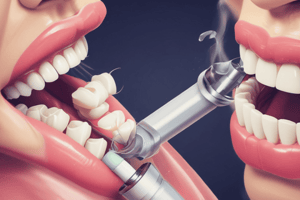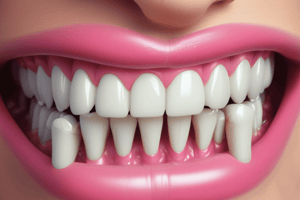Podcast
Questions and Answers
What is the primary technique used in creating a pedicle flap?
What is the primary technique used in creating a pedicle flap?
- Surgical extraction technique
- Lateral sliding technique
- Roll technique and papilla preservation technique (correct)
- Connective tissue grafting technique
In the semilunar coronally repositioned flap approach, where is the semilunar incision recommended to be placed?
In the semilunar coronally repositioned flap approach, where is the semilunar incision recommended to be placed?
- In the interdental region (correct)
- At the mucogingival junction
- On the labial aspect of the teeth
- In the buccal vestibule
What type of flap is used to create a reconstruction with intrasulcular and buccal incisions across the interdental papilla?
What type of flap is used to create a reconstruction with intrasulcular and buccal incisions across the interdental papilla?
- Semilunar coronally repositioned flap
- Pedicle flap
- Autogenous osseous graft flap
- Envelop type flap (correct)
Which technique involves retaining as much gingiva as possible with an intrasulcular incision around the lateral and central incisors?
Which technique involves retaining as much gingiva as possible with an intrasulcular incision around the lateral and central incisors?
What is the purpose of the horizontal incision made in the autogenous osseous graft technique?
What is the purpose of the horizontal incision made in the autogenous osseous graft technique?
What is packed around the grafted bone in the autogenous technique to shape the reconstructed interdental bone?
What is packed around the grafted bone in the autogenous technique to shape the reconstructed interdental bone?
What is a critical component of the microsurgery described in the cases mentioned?
What is a critical component of the microsurgery described in the cases mentioned?
In the envelop type flap technique, how is the palatal portion of the flap characterized?
In the envelop type flap technique, how is the palatal portion of the flap characterized?
What does 'white esthetics' refer to in modern restorative dentistry?
What does 'white esthetics' refer to in modern restorative dentistry?
What is the primary complication associated with the loss of interdental papillae?
What is the primary complication associated with the loss of interdental papillae?
Why is reconstruction of lost interdental papilla considered challenging?
Why is reconstruction of lost interdental papilla considered challenging?
What factor can contribute to the loss of interdental papillae?
What factor can contribute to the loss of interdental papillae?
Which of the following is not an aesthetic problem related to the interdental papilla?
Which of the following is not an aesthetic problem related to the interdental papilla?
What is one potential consequence of missing interdental papillae?
What is one potential consequence of missing interdental papillae?
Which surgical technique is often used to attempt to rebuild lost papillae?
Which surgical technique is often used to attempt to rebuild lost papillae?
What characteristic of the interdental papilla complicates its preservation during dental procedures?
What characteristic of the interdental papilla complicates its preservation during dental procedures?
What determines the shape of the interdental papilla?
What determines the shape of the interdental papilla?
What happens to the interdental papilla when a contact point is absent?
What happens to the interdental papilla when a contact point is absent?
Which study indicated that excised interdental papilla does not fully regenerate?
Which study indicated that excised interdental papilla does not fully regenerate?
Who was the first to describe the morphology of the interdental papilla?
Who was the first to describe the morphology of the interdental papilla?
What shape does interdental gingiva in the incisor area typically have?
What shape does interdental gingiva in the incisor area typically have?
Flashcards are hidden until you start studying
Study Notes
Pedicle Flap Technique
- Combines roll technique and papilla preservation technique
- Palatal split-thickness flap is dissected and labially elevated
- The flap is folded on itself and sutured to create a new papilla
Semilunar Coronally Repositioned Flap
- Based on flap design reported by Tarnow
- Semilunar incision placed in the interdental region
- Intrasulcular incisions are made around the mesial and distal half of the two adjacent teeth
- Connective tissue is displaced coronally
- Measured amount of sub-epithelial connective tissue from the palate is placed into the semilunar incision
Envelope Type Flap
- Intrasulcular and buccal incision made across the interdental papilla
- Envelope type split-thickness flap is elevated buccally and palatally
- Flap is dissected beyond the mucogingival line
- Connective tissue graft placed under flaps in recipient site
Autogenous Osseous and Connective Tissue Grafts
- Intrasulcular incision made around the neck of the lateral and central incisors
- Horizontal incision from mucogingival junction to the labial vestibular fold
- Gingivo-papillary unit displaced coronally
- Osseous graft from maxillary tuberosity is reshaped
- Crushed cancellous bone packed around the grafted bone
- Connective tissue graft from the palate is placed on top of the bone graft
Microsurgery
- Case report of three cases described microsurgical technique for Interdental Papilla augmentation
- No releasing incisions are used
- Minimizes tissue trauma, excessive bleeding, scarring, and pain
- Donor tissue survival is optimized because vascular supply remains intact
Interdental Papilla
- Importance: The interdental papilla is crucial for esthetics, phonetics, and function.
- Loss : Occurs due to periodontal disease, inflammation, bone resorption, surgical therapy, and lack of blood supply.
- Consequences: Cosmetic deformities (black triangle disease), phonetic problems (air/saliva passage), and food impaction.
- Challenges: Reconstruction of lost papilla is difficult and unpredictable.
- Goal: Preserve papillary integrity and minimize loss during dental procedures.
- Treatment: Non-surgical and surgical modalities for papilla preservation and reconstruction are available.
- Re-formation: Studies on monkeys showed papilla reformation after tissue stripping but complete regeneration is questionable.
- Morphology:
- Determined by tooth contact, approximal tooth surface width, and cemento-enamel junction.
- Incisor area: Pyramidal shape.
- Posterior region: Broader, concave col or bridge shape.
- Col: A defining feature of the interdental papilla (posterior region) that disappears when contact is absent or papilla migrates.
- Significance: The shape influences aesthetics and functionality.
Studying That Suits You
Use AI to generate personalized quizzes and flashcards to suit your learning preferences.




